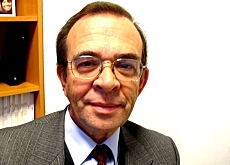
“Human rights lie at the heart of the UN”

A human rights expert tells swissinfo that Switzerland is working hard to ensure the United Nations establishes a new Human Rights Council.
But Adrien-Claude Zoller does not rule out that the council, which is intended to replace the discredited Human Rights Commission, will eventually migrate from Geneva to New York.
The UN resumed negotiations on the proposed Human Rights Council in New York on Wednesday. Among issues that need to be resolved are the size of the body, how members will be elected and how often it will meet.
Zoller, who is president of the non-governmental organisation Geneva for Human Rights, believes member states must grasp the opportunity to put human rights at the top of the UN agenda.
swissinfo: At the start of his first mandate UN Secretary-General Kofi Annan said he wanted to place human rights at the heart of the organisation. Is this idea still alive?
Adrien-Claude Zoller: It is very much alive. Security, development and human rights are the UN’s three main areas of activity. And Louise Arbour, the High Commissioner for Human Rights, is closely involved in all the work of the UN secretariat.
But the United Nations remains an organisation of states and a number of them continue to violate human rights. The end result is that in recent years fewer and fewer nations are prepared to approve resolutions condemning countries, following massacres or other serious human rights abuses.
The future Human Rights Council faces the same difficulty since it will be made up of countries, some of which will get themselves elected to avoid being criticised or condemned. The format and conditions by which nations are elected to the council are therefore very sensitive issues.
swissinfo: What should be retained from the Human Rights Commission?
A-C.Z.: The commission’s mandate allows it to more or less monitor each country’s respect for human rights. It is also a unique and often objective source of information for the United Nations to judge a situation in a given country.
The UN’s special rapporteur on racism [Doudou Diène] is currently in Switzerland and, believe me, his report will be anything but lenient.
What one will lose with the new council are the resolutions condemning states, although these have been losing momentum. Saying that, with a body that is more effective and meets more frequently throughout the year, it will be possible to rebuild a powerful tool.
swissinfo: The idea for this Human Rights Council is based on a Swiss initiative. How well have the country’s diplomats defended this dossier?
A-C.Z.: Like any new idea, it came under sustained attack at first – especially from countries which don’t respect human rights.
Both in Geneva and New York, Swiss diplomats have worked hard and have managed to garner support, particularly among South American nations. They have been quick to point out that if it hadn’t been for the commission’s work, dictatorships would still be in place in many countries.
Europe, of course, has a history in the area of human rights. But in seeking to speak with one voice, the European Union is defending the lowest common denominator, which increasingly boils down to its economic interests. The result is that its role at the heart of the Human Rights Commission has diminished in recent years.
swissinfo: Is there a risk that the future council will leave Geneva?
A-C.Z.: Not in the immediate future, since Geneva is home to a large number of humanitarian and human rights organisations. But in four or five years’ time, this option cannot be excluded.
It is around then that the UN will adopt the definitive statute for the Human Rights Council. If it becomes one of the main bodies within the United Nations – on the same level as the Security Council or the General Assembly – there is a risk of it moving to New York.
swissinfo-interview: Frédéric Burnand in Geneva
The next session of the Human Rights Commission is set to take place in Geneva from March 14 to April 22.
It is likely that this will be the commission’s final session before being replaced by the proposed Human Rights Council.
The parameters and composition of the new body, which is based on a Swiss initiative, are being thrashed out by UN member states in New York.

In compliance with the JTI standards
More: SWI swissinfo.ch certified by the Journalism Trust Initiative





























You can find an overview of ongoing debates with our journalists here . Please join us!
If you want to start a conversation about a topic raised in this article or want to report factual errors, email us at english@swissinfo.ch.